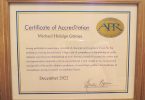The attention being focused on accreditation as a result of the debate about PRSA governance and the requirements for national board service has overshadowed the work being done to raise awareness of the credential and enhance its value. This already has been a particularly active year for accreditation, and it is about to get busier in the coming months. Here’s a quick status report.
Updating the current APR Examination. The Policies and Procedures of the Universal Accreditation Board (UAB) — the multi-organizational body that maintains the accreditation program — require that an analysis of the public relations profession be conducted every ten years. The 2010 practice analysis was completed earlier this year, providing perspective for the new roles, methodologies and technologies that the profession has adopted over the past decade.
The knowledge, skills and abilities tested in the Examination for Accreditation now can be adjusted to reflect the new realities, helping to keep the APR credential topical and relevant. The Readiness Review process and APR preparation programming also will be updated accordingly.
APR+M. A new credentialing effort providing public affairs and communication certification for military, contractor and Department of Defense public communication professionals was introduced in May. A joint effort between the UAB, the U.S. Joint Forces Command’s Joint Public Affairs Support Element (JPASE) and PRSA, it is the first program in the accreditation portfolio specifically designed for — and targeted to — a vertical practice area.
The steps to obtaining the APR+M credential are in sync with those required for the existing Accredited in Public Relations (APR) credential. Armed service and civilian personnel must complete a candidate questionnaire, present a professional portfolio as part of the Readiness Review and pass a computer-based examination. To obtain the APR+M credential, candidates also must fulfill specific military communication prerequisites as determined by the APR+M Council.
A group of seven professionals already credentialed under the traditional APR program have earned their APR+M certification. In addition, the first APR+M Readiness Review sessions will be conducted at this year’s International Conference in Washington, D.C.
Entry-Level Credentialing. Sensing an unmet marketplace need, the UAB has formed a working group to look at developing a new certification for recent graduates of university public relations programs. Such a program would give employers an additional way of vetting entry-level professionals, help new professionals differentiate themselves in an increasingly crowded and competitive job market and provide public relations program leaders with post-diploma metrics on the abilities of their graduates.
Under the leadership of UAB Vice-Chair Jay Rayburn, PhD, APR, Fellow PRSA, the working group is currently identifying options that are fully self-supporting, e.g., revenue and expense neutral to PRSA and other UAB participating organizations, but that offer a clear pathway to incremental revenue.
Pilot implementation is targeted for Fall 2011, with a rollout of the new credential and program – supported by a robust marketing campaign – planned for Fall 2012.
Strategic Task Force on Accreditation. At the PRSA Board‘s direction, a Strategic Task Force on Accreditation has been formed to develop a long-term vision for the credential: what the public relations credential of the future should look like, how it would impact the profession and the professional, and how it fits into the broader structure and perceptions of the profession, among other strategic considerations. Of particular interest is efficient and effective approaches to gain broader employer and business awareness and acceptance of the credential in the marketplace.
As the board liaison both to the UAB and the PRSA Accreditation Marketing Task Force, I was asked by PRSA Chair and CEO Gary McCormick, APR, Fellow, PRSA to chair the Strategic Task Force on Accreditation. We expect to deliver an update on our work to date to this year’s Assembly, and hope to have substantial recommendations to share during the second quarter of 2011, in conjunction with Accreditation Month in April.
Anyone interested in being a part of the task force is invited to contact either me or Barb McDonald.
Clearly, accreditation has been under a microscope for reasons outside the core intent of the program. Still, accreditation has a significant following and holds tremendous potential that has yet to be unlocked. The PRSA Board supports accreditation – past, present and future – and is interested in hearing and seeing what other members of the Society are able to do to help raise awareness of the credential and enhance its value.
Blake Lewis, APR, Fellow PRSA, is a member of the PRSA Board of Directors and Principal and Senior Consultant at Lewis Public Relations.







Excellent commentary. As a member of the Universal Accreditation Board, I hope this post:
1. Illustrates the tremendous amount of work being done to advance the Accreditation credential.
2. Reinforces the value behind the APR as a key driver behind advancing the public relations profession.
How do we get our clients to care about accreditation? People care if their doctor is an MD for fear they might die. People fear that if their lawyer isn’t accredited they will go to jail. What do people fear by not having their PR expert accredited?